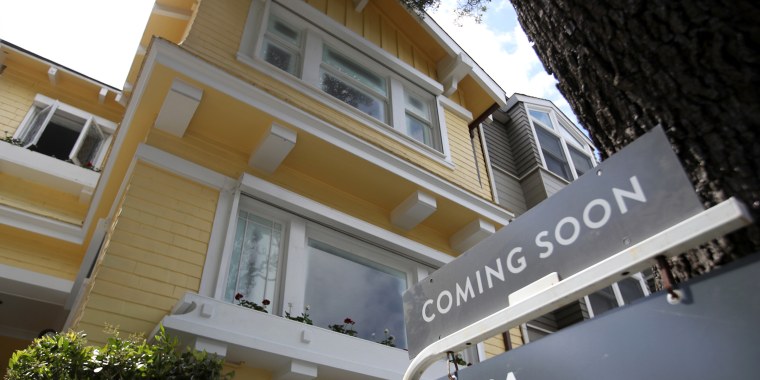As we cautiously begin to come out of the pandemic, the housing market is very tight, and can be intimidating for first-time buyers. With tons of potential buyers and not enough homes for sale, bidding on a home has become a competitive sport. According to Zillow, an online real estate marketplace, U.S. home prices are forecasted to appreciate 11.7% in value over the next 12 months. That's only a little lower than over the past 12 months, when homes appreciated at 17.7% in value, which means the market will go from white hot to red hot (which is still pretty hot!).
But if you're a first-time home buyer, don't despair. You can still take steps toward the rite of passage of adulthood and homeownership is still a possibility, says NBC senior business correspondent Stephanie Ruhle.
Buying a home is the biggest purchase most people will make in a lifetime. The market can be confusing to navigate but according to Ruhle, all hope should not be lost.
What should all first-time homebuyers know?
"Right now, the housing market is white hot," says Ruhle. "People are bidding way over asking or offering all cash to get a home."
Ruhle says to look for homes that are a little under your budget so you can afford to offer above the asking price if needed. "Don't forget to include closing costs in your budget, too," she says. "That can add a couple thousand dollars to the bill."
Also keep in mind that not every home needs to be perfect, especially for first-time homebuyers. "Remember, the land that you buy is what grows in value, not the home itself," says Ruhle.
So if you need to compromise on your floor plan or getting a finished basement in order to buy a place that will appreciate in value in a couple of years, that might be worth it.
What financial boxes should you tick before you start the homebuying process?
The first thing a potential buyer should do is to realistically figure out how much they can spend on a home. "If you are going from renting to buying there may be a lot of costs you're not used to paying such as taxes, maintenance, and homeowner's insurance, to name a few," says Ruhle.
Consider the 28/36 rule — that means your your mortgage payment should not be more than 28% of your monthly pre-tax income and no more than 36% of your total debt.
Also think about an emergency fund for your new home, as you never know when you might need a couple thousand dollars on hand if there's a pressing issue, advises Ruhle.
Be sure to review your credit report which lists all of your lines of credit including loans from banks and credit cards, and know your credit score. "That will be key to getting a mortgage," says Ruhle. "Many lenders will look at your FICO score, though there are different sources for credit scores."
Finally, make sure you shop around for different loans. "You want to know exactly what you are paying each month and over the long haul, what the interest rate is and any other terms," says Ruhle. "You do not need to go with whichever bank will pre-approve you first."
If you don't have a 20% down payment, is there anything you can do?
If you don't have a big enough deposit to put down on a home, there are down payment assistance programs that can help first-time homebuyers get grants and low interest loans to make their dreams a reality.
"These programs vary by location, so check with your state," says Ruhle. There are some rules and these programs usually help people with low to moderate income and solid credit scores. "But check the fine print with the programs you can apply to," she says. "If you have owned a home before but not in the past three years, you may still be eligible."
If you are, these loans can help big time — some cover anywhere from $50,000 to $80,000.
What's one mistake homebuyers should avoid?
"Do not forgo your inspection," says Ruhle. "That can lead to an expensive and time-consuming nightmare. I know, the market is super-competitive right now and giving up the chance to make sure you know exactly what you are getting can be tempting," she says. "But trust me, this is not what you want to skimp on."
If you already own a home, what do you need to know to save money?
Ruhle says the single biggest thing you can do to save money is to regularly maintain your home. "It might not be fun or cheap but tackling smaller problems as they come up will help prevent big expenses down the road and increase the value of your home when it is time to sell."
For more great info on homebuying tune in to Stephanie's latest episode of "On The Money," streaming on TODAY All Day.
Related:
